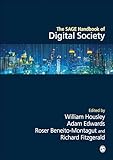The SAGE handbook of digital society /
| Item type | Current location | Collection | Call number | Status | Date due | Barcode | Course reserves |
|---|---|---|---|---|---|---|---|
 Computer Files
Computer Files
|
ASCOT Library - Zabali Campus On Display | General Reference | Eb 303.4833 S129 c2023 (Browse shelf) | Available | 5421e |
Browsing ASCOT Library - Zabali Campus shelves, Shelving location: On Display, Collection: General Reference Close shelf browser

|
No cover image available No cover image available |

|

|

|

|
No cover image available No cover image available | ||
| Eb 005.74 B651 ©2020 Blockchain and Web 3.0: social, economic, and technological challenges / | Eb 300.72 IN58 c2019 Innovation beyond technology: science for society and interdisciplinary approaches / | Eb 303.48 G575 c2022 Science, technology and society: an introduction / | Eb 303.4833 S129 c2023 The SAGE handbook of digital society / | Eb 338.10265 Ar791 c2022 Artificial intelligence and smart agriculture technology / | Eb 363.7 Ak315 c2019 Environmental science: society, nature, and technology / | Eb 370 D273 c2023 Green academia: towards eco-friendly education systems / |
Includes bibliographical references and index.
Contents:
Preface
Part 1: Theorising Digital Societies
Chapter 1: The Emerging Contours of Digital Society: Remastering, Reconsideration, Reorientation and New Socio-Digital Domains
Chapter 2: Digital Stratification: Class, Status Group and Party in the Age of the Internet
Chapter 3: Crime, Control and the Ambiguous Gifts of Digital Technology
Chapter 4: Digital Mobilities and Digital Society
Chapter 5: Disconnection and Digital Society: Perspectives on How Citizens Deal with Media Technology
Part 2: Researching Digital Societies
Chapter 6: Developing tools and Interdisciplinary Collaboration for Digital Social Research
Chapter 7: Quantitative Research Methods Teaching in a Digital Age
Chapter 8: The Research Stack: A Framework for Data-driven Humanities and Social Science
Chapter 9: Ethnography and Digital Society
Chapter 10: Understanding Identity and Platform Cultures Chapter 11: Instagram Aesthetics for Social Change: A Narrative Approach to Visual Activism on Instagram
Chapter 12: Researching Digital Discourse and Interaction
Chapter 13: Researching Algorithms and Artificial Intelligence
Part 3: Socio-technical Systems and Disruptive Technologies in Action
Chapter 14: Social Media analytics: Boom and Bust?
Chapter 15: Games and Mediated Playful Practices
Chapter 16: Algorithmic Configurations of Sexuality: Theoretical Foundations and Methodological Approaches
Chapter 17: Drones as Disruptive Socio-technical Systems: A Case Study of Drone Crime and Control
Chapter 18: Internet of Things and New Frontiers of Datafication
Part 4: Digital Society and New Social Dilemmas
Chapter 19: Digital Racism
Chapter 20: Social Media, Gender and Online Discrimination
Chapter 21: Online Safeguarding of Adults with an Intellectual Disability: How Do We Ensure that Participation and Protection Rights are Adequately Met in Digital Society? Chapter 22: Clickbait in the Commodification of Sympathy: Disability, Inspiration Porn and the Possibilities for New Narratives
Chapter 23: Political Communication in the Digital Age
Part 5: Governance and Regulation
Chapter 24: Algorithmic Governance: Technology, Knowledge and Power
Chapter 25: Digital (Dis)information Operations and Misinformation Campaigns
Chapter 26: Frauds in Digital Society
Chapter 27: The Responsible Innovation of Disruptive Technologies
Chapter 28: Governing Through Infrastructural Control: Artificial Intelligence and Cloud Computing in the data-intensive State
Part 6: Digital Futures
Chapter 29: Freedom of speech and online safety in liberal democracies: a triadic concept
Chapter 30: Digital transformation and the future of work
Chapter 31: Conversational AI: respecifying participation as regulation
Chapter 32: Critical data futures
Chapter 33: Mediating the message in digital society
Summary:
"This SAGE Handbook of Digital Society brings together cutting edge social scientific research
and theoretical insight into the emerging contours of digital society. Chapters explore the
relationship between digitisation, social organisation and social transformation at both the
macro and micro level, making this a valuable resource for postgraduate students and academics
conducting research across the social sciences.
The topics covered are impressively far-ranging and timely, including machine learning, social
media, surveillance, misinformation, digital labour and beyond. This innovative Handbook
perfectly captures the state of the art of a field which is rapidly gaining cross-disciplinary
interest and global importance, and establishes a thematic framework for future teaching and
research"--provided by the publisher


There are no comments on this title.